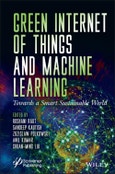Encapsulates different case studies where green-IOT and machine learning can be used for making significant progress towards improvising the quality of life and sustainable environment.
The Internet of Things (IoT) is an evolving idea which is responsible for connecting billions of devices that acquire, perceive, and communicate data from their surroundings. Because this transmission of data uses significant energy, improving energy efficiency in IOT devices is a significant topic for research. The green internet of things (G-IoT) makes it possible for IoT devices to use less energy since intelligent processing and analysis are fundamental to constructing smart IOT applications with large data sets. Machine learning (ML) algorithms that can predict sustainable energy consumption can be used to prepare guidelines to make IoT device implementation easier.
Green Internet of Things and Machine Learning lays the foundation of in-depth analysis of principles of Green-Internet of Things (G-IoT) using machine learning. It outlines various green ICT technologies, explores the potential towards diverse real-time areas, as well as highlighting various challenges and obstacles towards the implementation of G-IoT in the real world. Also, this book provides insights on how the machine learning and green IOT will impact various applications: It covers the Green-IOT and ML-based smart computing, ML techniques for reducing energy consumption in IOT devices, case studies of G-IOT and ML in the agricultural field, smart farming, smart transportation, banking industry and healthcare.
Audience
The book will be helpful for research scholars and researchers in the fields of computer science and engineering, information technology, electronics and electrical engineering. Industry experts, particularly in R&D divisions, can use this book as their problem-solving guide.
Table of Contents
Preface xvii
1 G-IoT and ML for Smart Computing 1
Karunendra Verma, Vineet Raj Singh Kushwah and Nilesh
1.1 Introduction 2
1.2 Machine Learning 2
1.3 Deep Learning 6
1.4 Correlation Between AI, ML, and dl 7
1.5 Machine Learning-Based Smart Applications 7
1.6 IoT 11
1.7 Green IoT 12
1.8 Green IoT-Based Technologies 13
1.9 Life Cycle of Green IoT 16
1.10 Applications 16
1.11 Challenges and Opportunities for Green IoT 21
1.12 Future of G-IoT 22
1.13 Conclusion 22
References 23
2 Machine Learning-Enabled Techniques for Reducing Energy Consumption of IoT Devices 27
Yogini Dilip Borole, Jaya Dofe and C. G. Dethe
2.1 Introduction 28
2.2 Internet of Things (IoT) 33
2.3 Empowering Tools 35
2.4 IoT in the Energy Sector 48
2.5 Difficulties of Relating IoT 61
2.6 Future Trends 66
2.7 Conclusion 72
References 73
3 Energy-Efficient Routing Infrastructure for Green IoT Network 87
Pradeep Bedi, S. B. Goyal, Jugnesh Kumar and Shailesh Kumar
3.1 Introduction 88
3.2 Overview of IoT 89
3.3 Perspectives of Green Computing: Green IoT 91
3.4 Routing Protocols for Heterogeneous IoT 99
3.5 Machine Learning Application in Green IoT 104
3.6 Conclusion 107
References 107
4 Green IoT Towards Environmentally Friendly, Sustainable and Revolutionized Farming 113
Ravi Manne and Sneha Chowdary Kantheti
4.1 Introduction 114
4.2 How is Machine Learning Used in Agricultural Field? 119
4.3 What is IoT? How Can IoT Be Applied in Agriculture? 127
4.4 What is Green IoT and Use of Green IoT in Agriculture? 130
4.5 Conclusion: Risks of Using G-IoT in Agriculture 135
References 138
5 CIoT: Internet of Green Things for Enhancement of Crop Data Using Analytics and Machine Learning 141
Sahana Shetty and Narayana Swamy Ramaiah
5.1 Introduction 142
5.2 Motivation 146
5.3 Review of Literature 147
5.4 Problem with Traditional Approach 154
5.5 Tool Requirement 155
5.6 Methodology 159
5.7 Conclusion 160
References 161
6 Smart Farming Through Deep Learning 163
Sandeep Mathur, Disha Vaid and Ajay Rana
6.1 Introduction 163
6.2 Literature Review 165
6.3 Deep Learning in Agriculture 169
6.4 Smart Farming 174
6.5 Image Analysis of Agricultural Products 176
6.6 Land-Quality Check 178
6.7 Arduino-Based Soil Moisture Reading Kit 180
6.8 Conclusion 183
6.9 Future Work 184
References 185
7 Green IoT and Machine Learning for Agricultural Applications 189
Keshavi Nalla and Seshu Vardhan Pothabathula
7.1 Introduction 190
7.2 Green IoT 192
7.3 Machine Learning 201
7.4 Conclusion 210
References 210
8 IoT-Enabled AI-Based Model to Assess Land Suitability for Crop Production 215
Aneesha Gudavalli, G. JayaLakshmi and Suneetha Manne
8.1 Introduction 216
8.2 Literature Survey 217
8.3 Conclusion 235
References 235
9 Green Internet of Things (GIoT): Agriculture and Healthcare Application System (GIoT-AHAS) 239
Anil L. Wanare and Sahebrao N. Patil
9.1 Introduction 240
9.2 Relevant Work and Research Motivation for GIoT-AHAS 243
9.3 Conclusion 263
References 264
10 Green IoT for Smart Transportation: Challenges, Issues, and Case Study 269
Pradnya Borkar, Vijaya Balpande, Ujjwala Aher, Roshani Raut and M. Sulas Borkar
10.1 Introduction 270
10.2 Challenges of IoT 270
10.3 Green IoT Communication Components 274
10.4 Applications of IoT and Green IoT 275
10.5 Issues of Concern 279
10.6 Challenges for Green IoT 280
10.7 Green IoT in Smart Transportation: Case Studies
10.8 Conclusion 292
References 292
11 Green Internet of Things (IoT) and Machine Learning (ML): The Combinatory Approach and Synthesis in the Banking Industry 297
Prakashkumar Hasmukhbhai Patel, Chetan K Rathod and Karan Zaveri
11.1 Introduction 298
11.2 Research Objective 299
11.3 Methodology 299
11.4 Result and Discussion 299
11.5 Conclusion 313
References 314
12 Green Internet of Things (G-IoT) Technologies, Application, and Future Challenges 317
Komal Saxena, Abdul Basit and Vinod Kumar Shukla
12.1 Introduction 318
12.2 The Internet of Thing (IoT) 319
12.3 Elements of IoT 322
12.4 The Green IoT: Overview 325
12.5 Green IoT Technologies 326
12.6 Green IoT Applications 329
12.7 IoT in 5G Wireless Technologies 333
12.8 Internet of Things in Smart City 335
12.9 Green IoT Architecture for Smart Cities 337
12.10 Advantages and Disadvantages of Green IoT 342
12.11 Opportunities and Challenges 343
12.12 Future of Green IoT 344
12.13 Conclusion 345
References 345
Index 349








